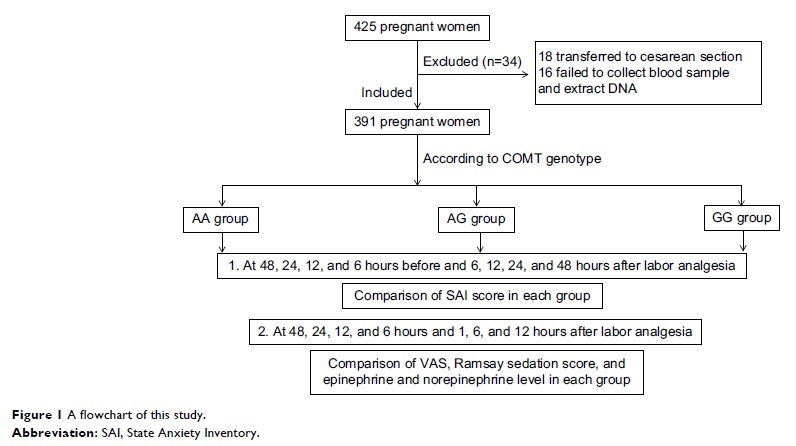108384
论文已发表
注册即可获取德孚的最新动态
IF 收录期刊
- 3.4 Breast Cancer (Dove Med Press)
- 3.2 Clin Epidemiol
- 2.6 Cancer Manag Res
- 2.9 Infect Drug Resist
- 3.7 Clin Interv Aging
- 5.1 Drug Des Dev Ther
- 3.1 Int J Chronic Obstr
- 6.6 Int J Nanomed
- 2.6 Int J Women's Health
- 2.9 Neuropsych Dis Treat
- 2.8 OncoTargets Ther
- 2.0 Patient Prefer Adher
- 2.2 Ther Clin Risk Manag
- 2.5 J Pain Res
- 3.0 Diabet Metab Synd Ob
- 3.2 Psychol Res Behav Ma
- 3.4 Nat Sci Sleep
- 1.8 Pharmgenomics Pers Med
- 2.0 Risk Manag Healthc Policy
- 4.1 J Inflamm Res
- 2.0 Int J Gen Med
- 3.4 J Hepatocell Carcinoma
- 3.0 J Asthma Allergy
- 2.2 Clin Cosmet Investig Dermatol
- 2.4 J Multidiscip Healthc

COMT 多态性、劳动焦虑和孕妇镇痛之间的关系
Authors Ren X, Zhang L, Xiao Q, Huang D, Liu Q, Zhang Y
Received 30 October 2018
Accepted for publication 17 January 2019
Published 27 February 2019 Volume 2019:12 Pages 779—785
DOI https://doi.org/10.2147/JPR.S192719
Checked for plagiarism Yes
Review by Single-blind
Peer reviewers approved by Dr Andrew Yee
Peer reviewer comments 2
Editor who approved publication: Dr Michael Ueberall
Background: COMT gene
polymorphism is associated with mental disorders and sensitivity to pain. In
this study, we investigated the association between the COMT gene polymorphism
and labor anxiety and analgesia in pregnant women.
Subjects and methods: A total
of 425 pregnant women undergoing labor analgesia were selected from May 2016 to
February 2018. The COMT gene polymorphism was detected through the PCR with
restriction fragment length polymorphism technique before childbirth. According
to a COMT genotype, the enrolled pregnant women were subdivided into the
Val/Val (allele GG) group, the Met/Met (allele AA) group, and the Val/Met
(allele GA) group. Then, the intervertebral space of all pregnant women was
injected with 3 mL of 2% lidocaine +6 mL of 0.08% ropivacaine and 6 µg of
fentanyl. Labor analgesia was administered as follows: 80 mg of 0.08%
ropivacaine +100 µg of fentanyl + normal saline to 100 mL. The general
characteristics of the women were examined and recorded. In addition, the State
Anxiety Inventory (SAI), VAS, Ramsay sedation score, and epinephrine and
norepinephrine levels were compared and analyzed.
Results: A total
of 391 pregnant women were enrolled in this study; among these pregnant women,
there were 180 pregnant women in the GG group, 132 in the GA group, and 99 in
the AA group. The minor allele frequency of COMT polymorphism among these
pregnant women was 32.8%. Compared with the GG group, the SAI and VAS scores
were higher, the Ramsay sedation score was lower, and the epinephrine and
norepinephrine levels were higher in AA and GA groups (P <0.05).
Nonetheless, there was no statistically significant difference in the SAI, VAS,
Ramsay sedation score, and epinephrine and norepinephrine levels between the
groups AA and GA (P >0.05).
Conclusion: The COMT
gene polymorphism was associated with labor anxiety and analgesia among
pregnant women, and the Val158Met mutation in the COMT gene
could lead to worse labor anxiety and less-effective labor analgesia in
pregnant women.
Keywords: COMT,
polymorphism, labor anxiety, labor analgesia
